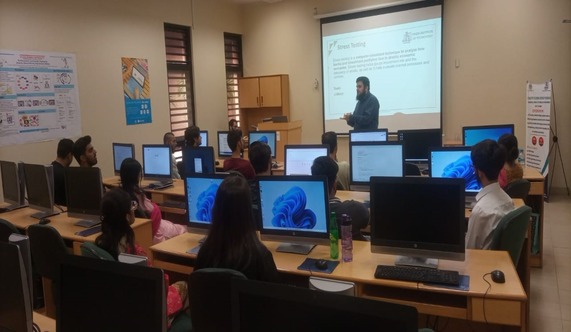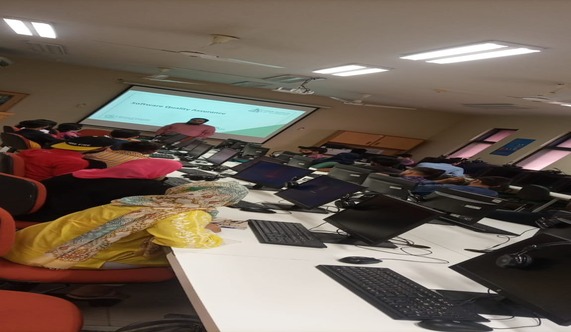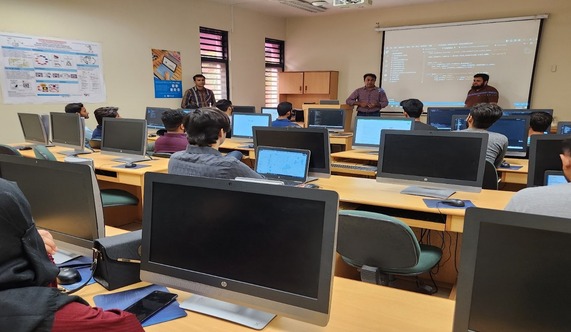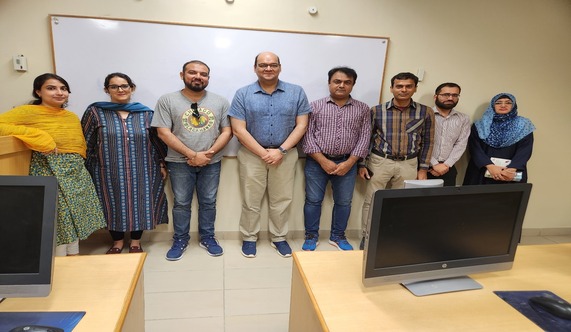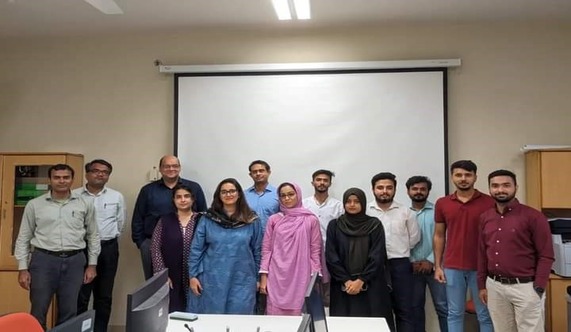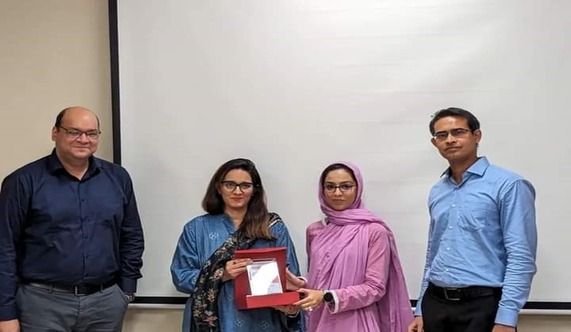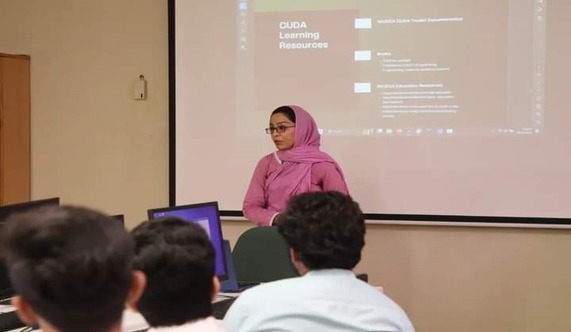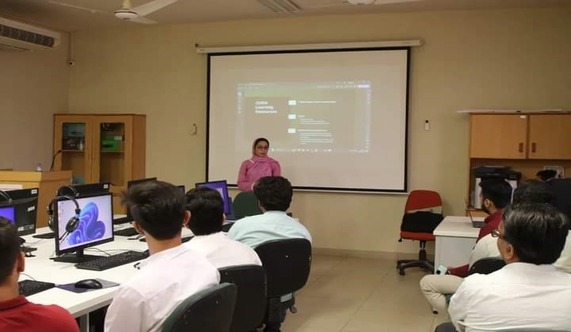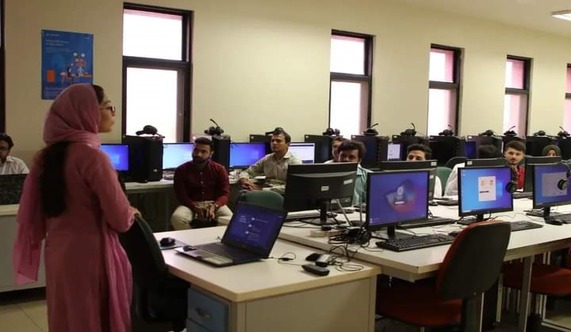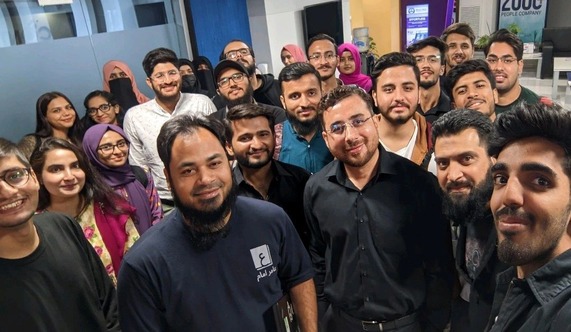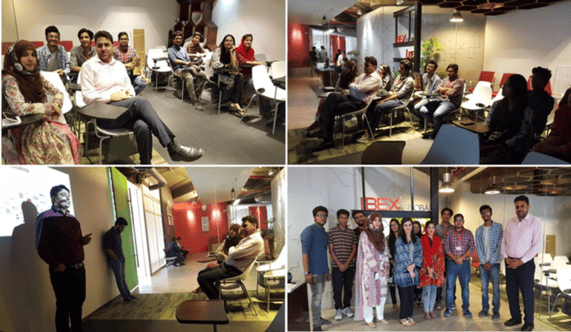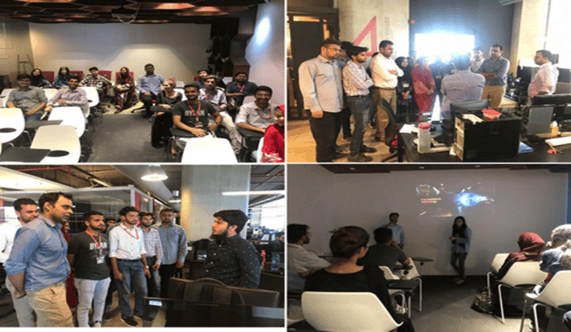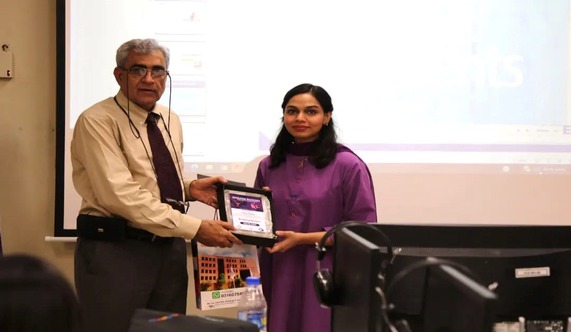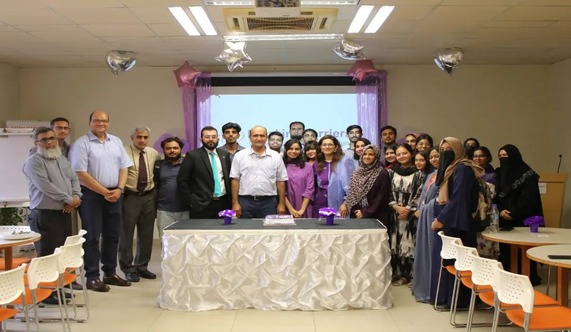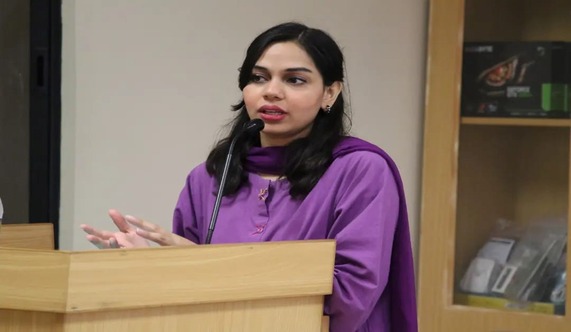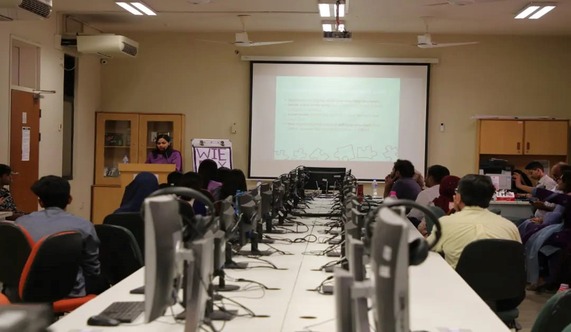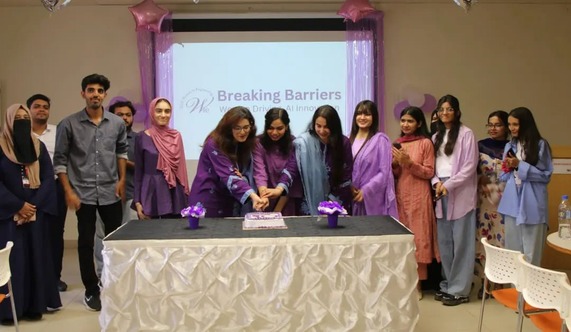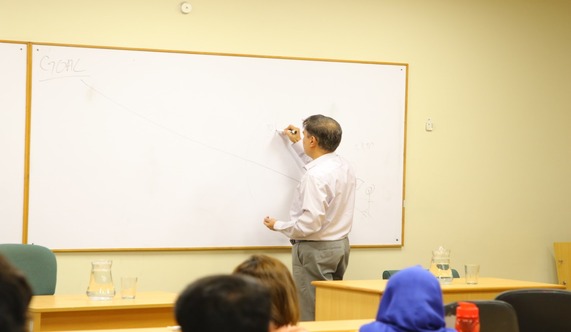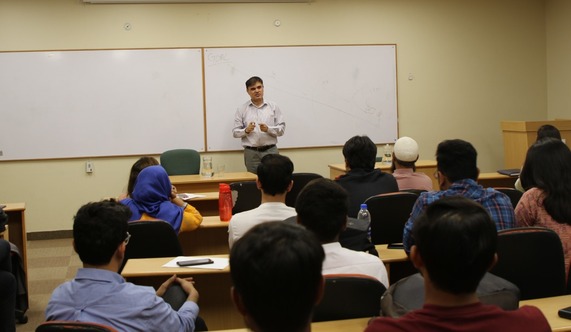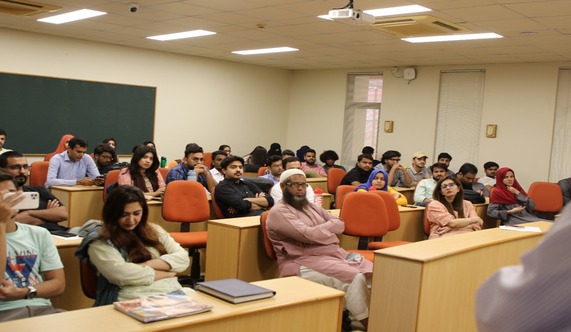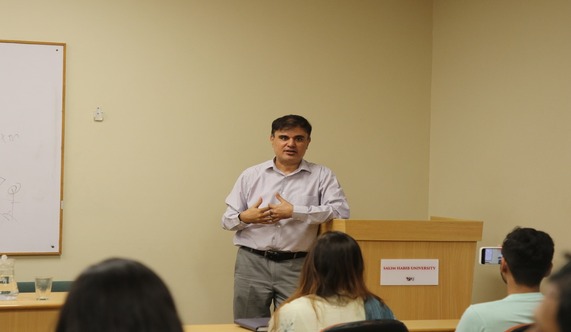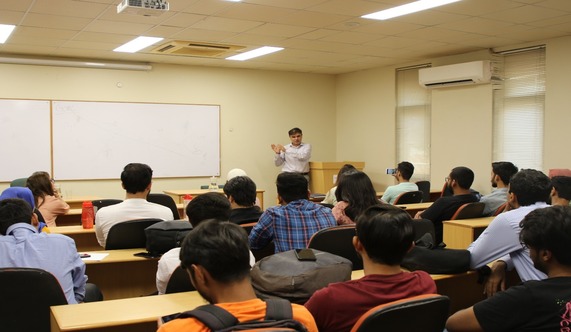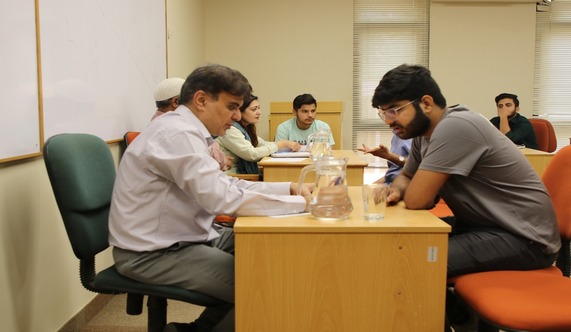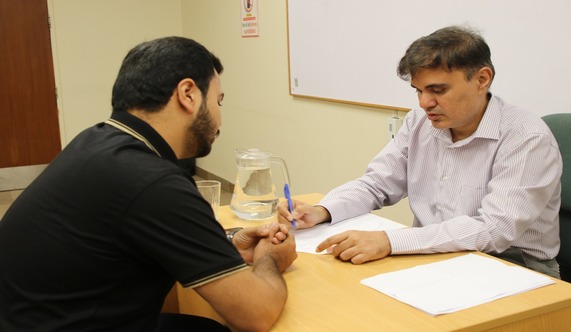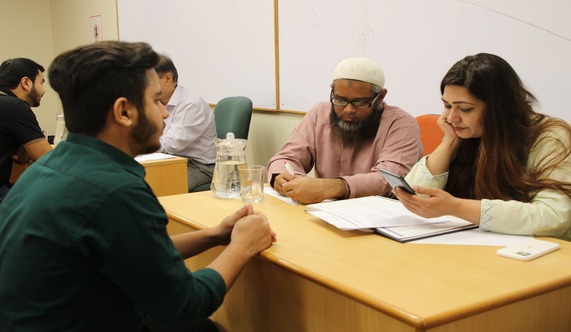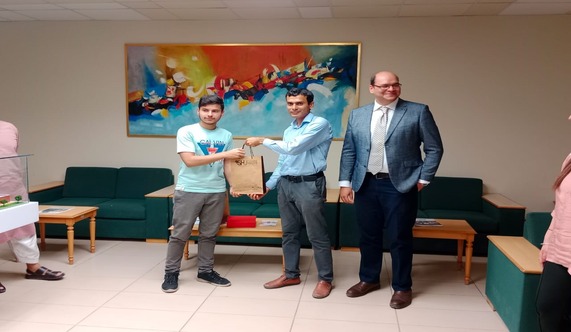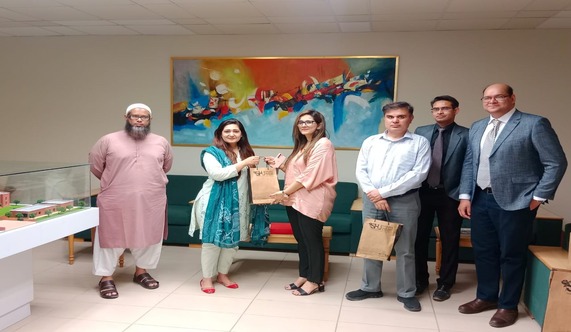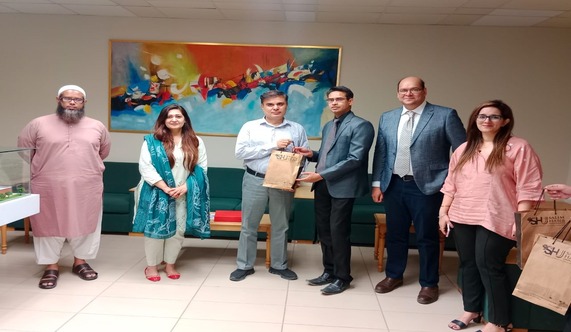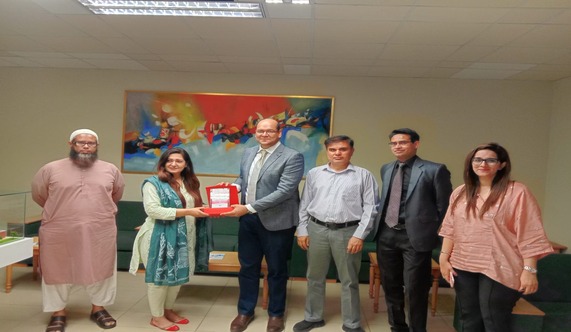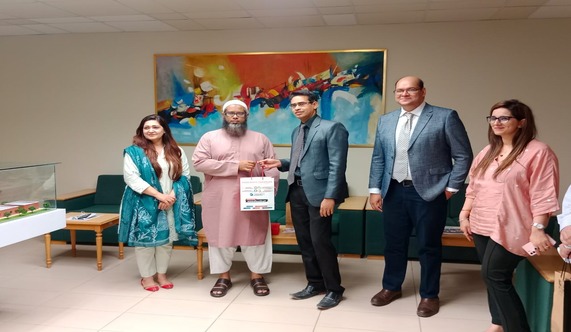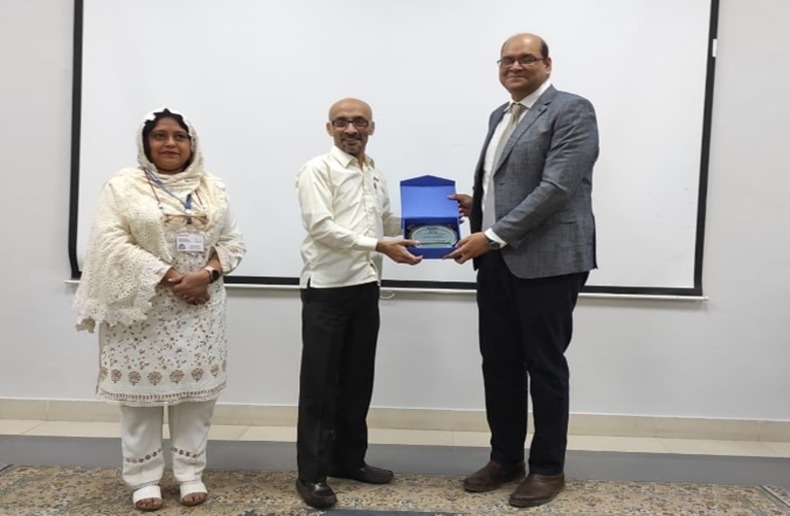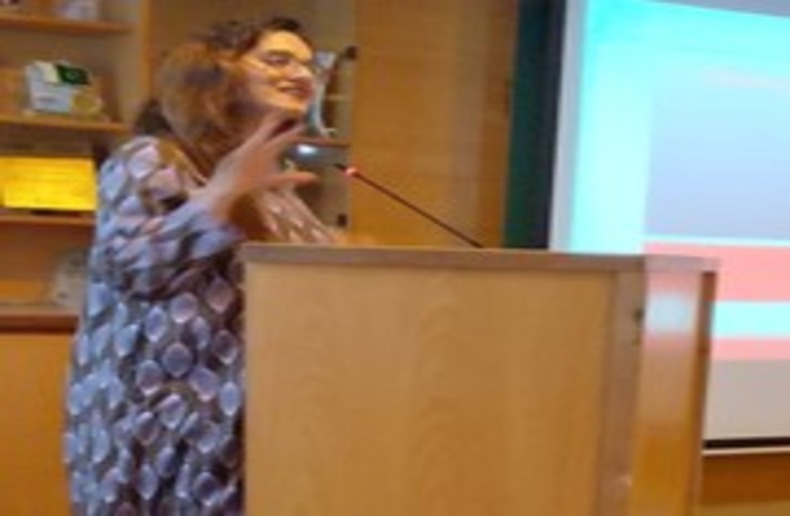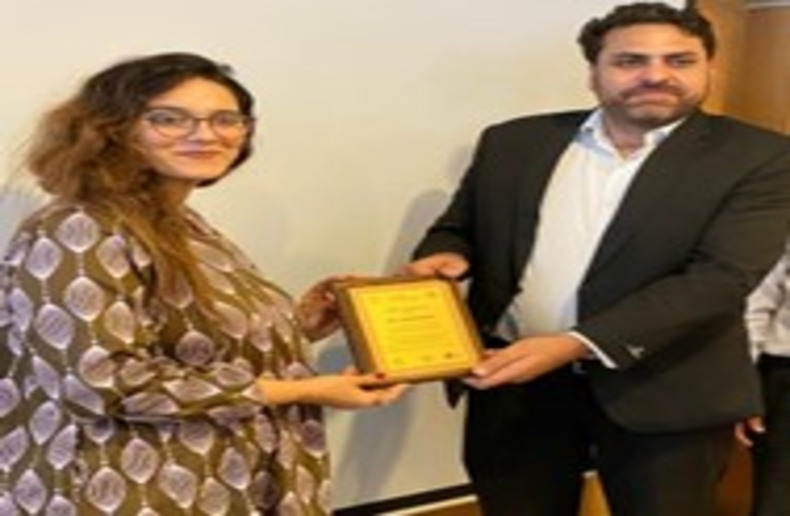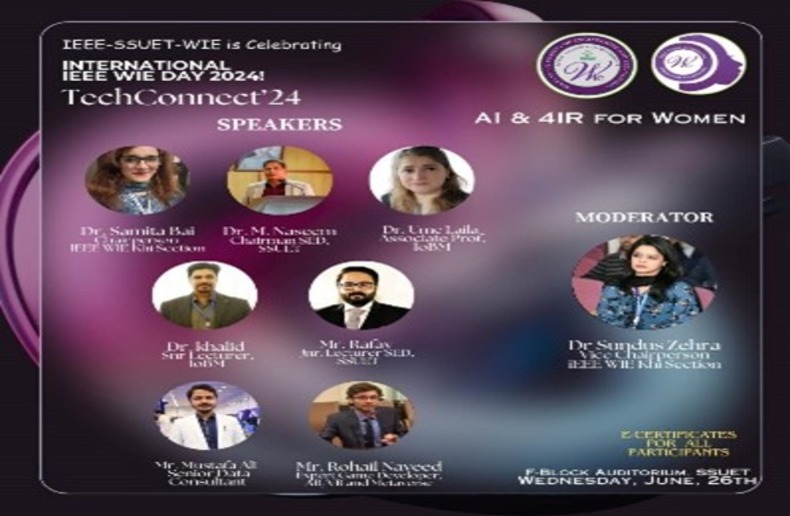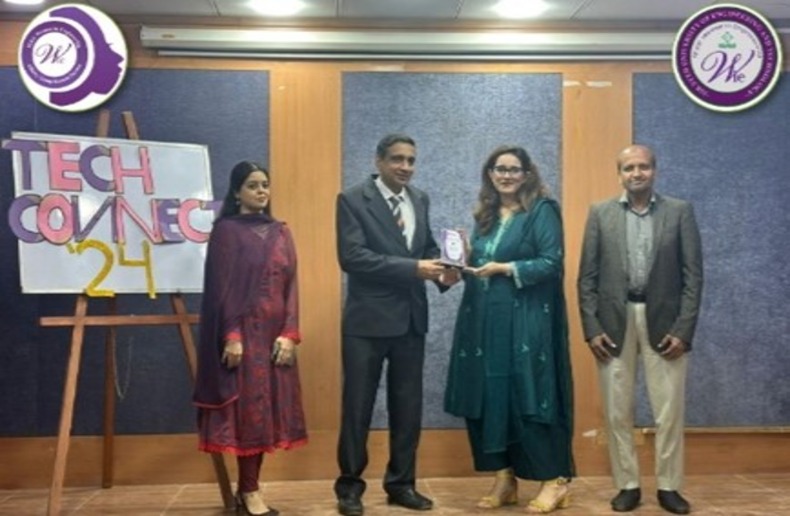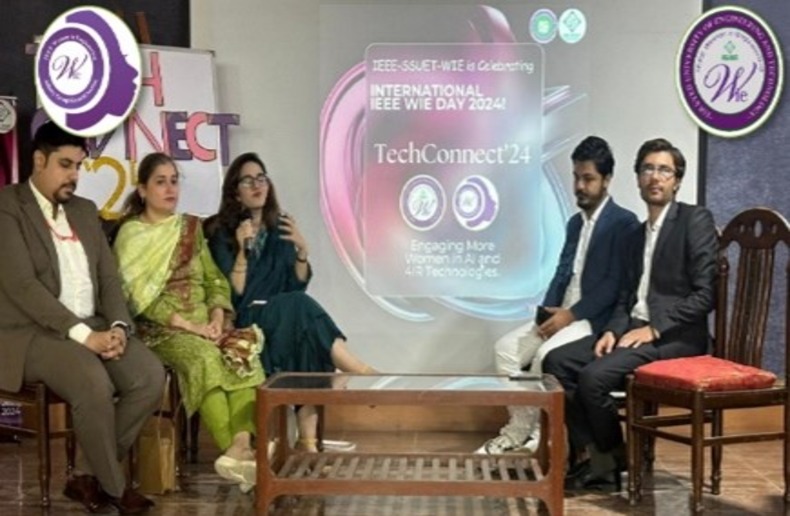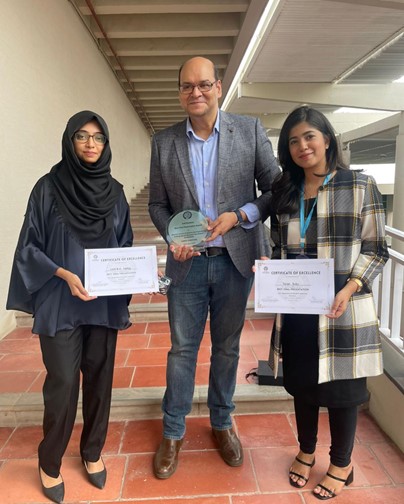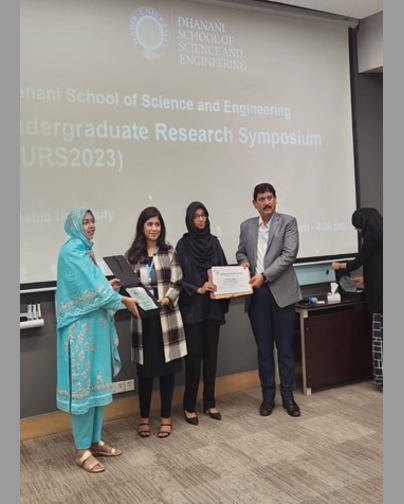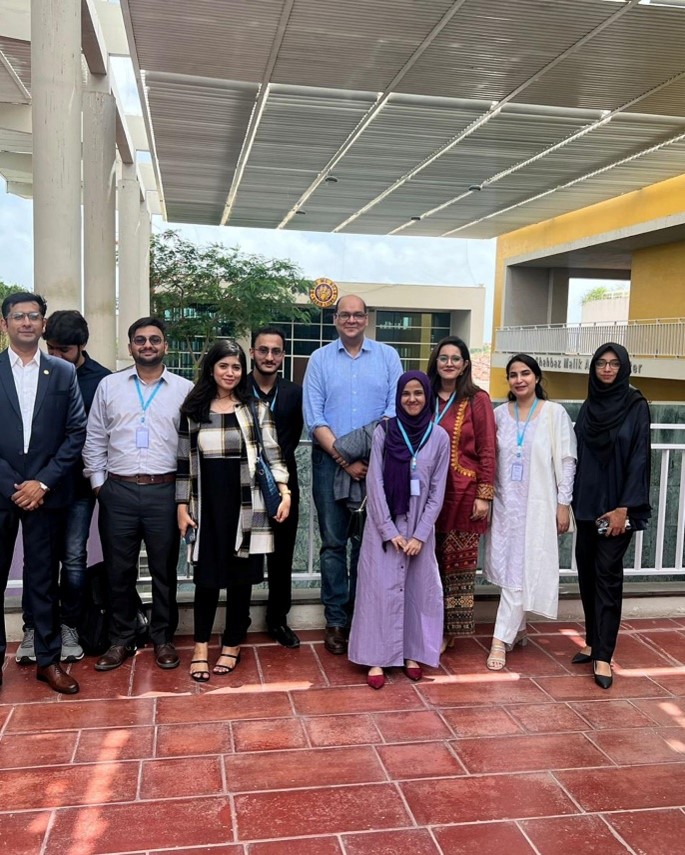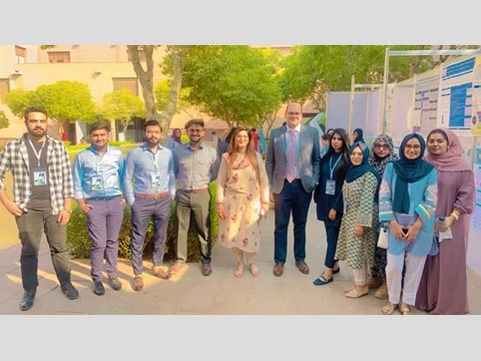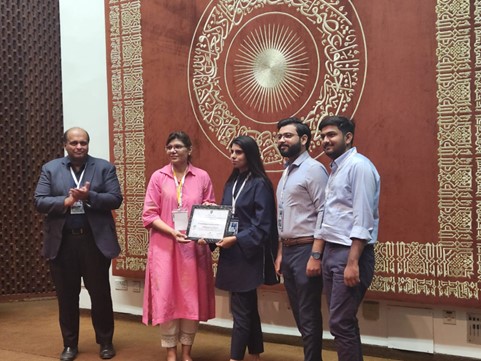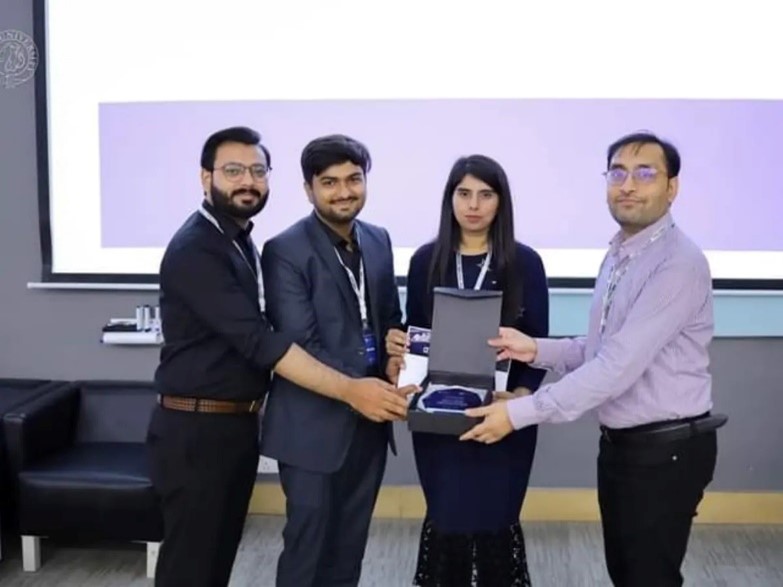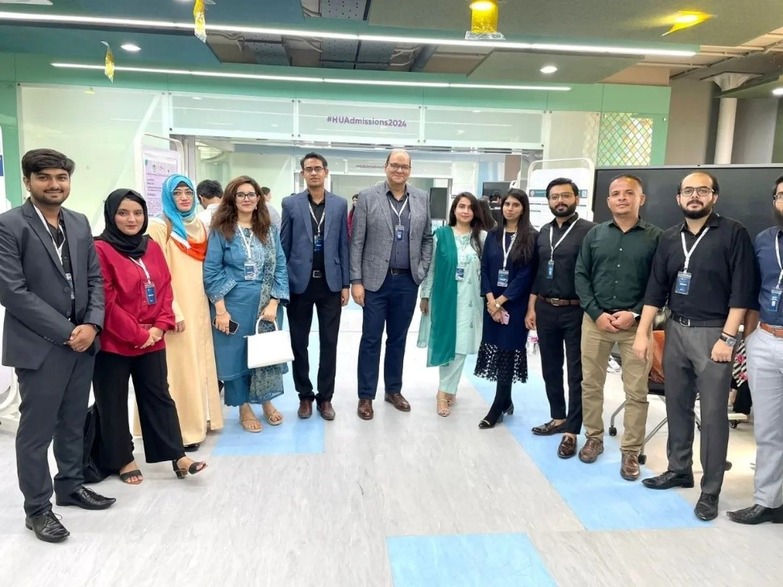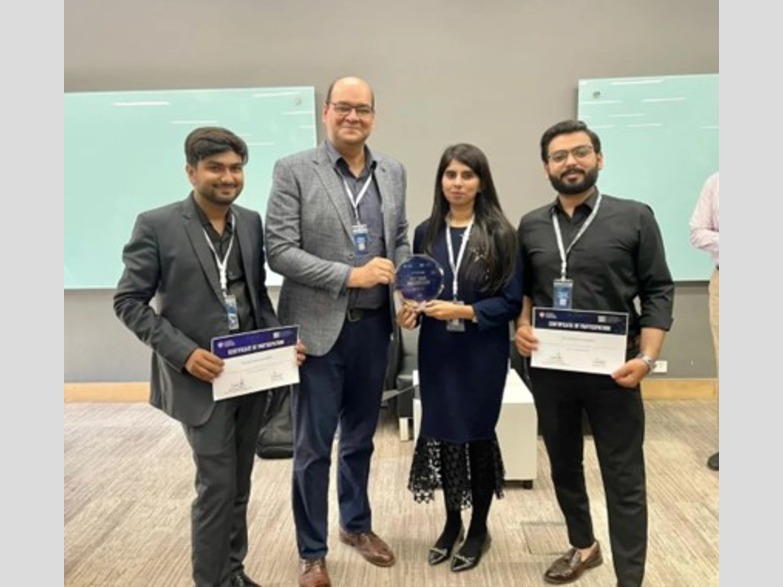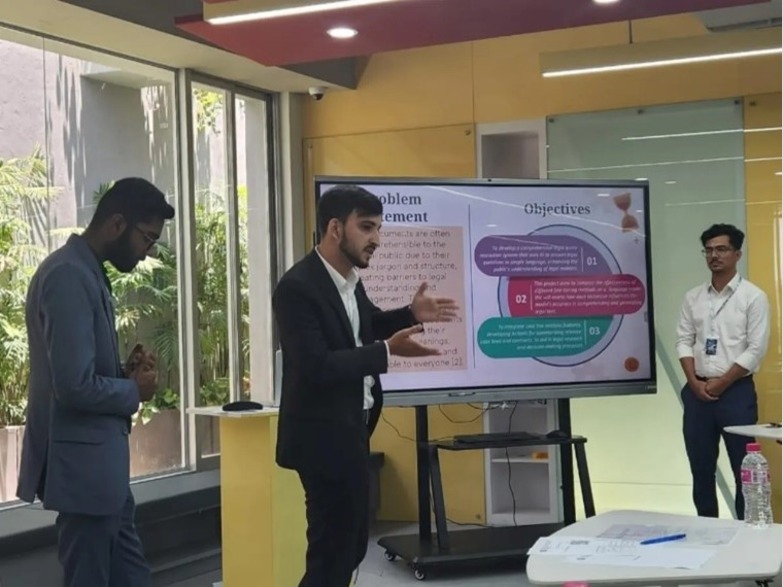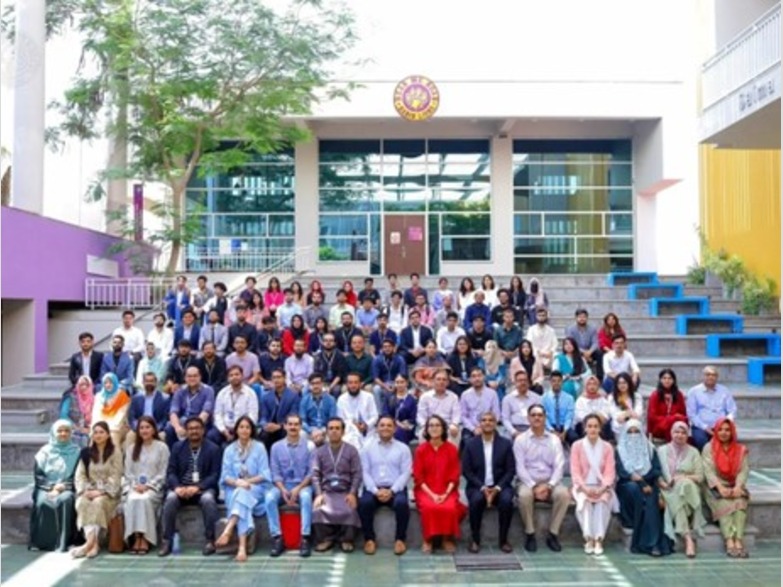Dean's Message
This millennium is an era of innovation and change, and this change is not limited to any specific industry rather it is wrapping around every walk of life. Education is no different. Traditional boundaries between different educational specializations are fading away. This disruptive trend has given birth to many professions which were never thought of before, for example medical physicists, computational biologists, computational historians etc. One common aspect in all of these different interdisciplinary educational specializations is that technology, specifically computational technology is taking center stage. This is now no surprise that the future will be shaped by the people who will have the capability of working with these computational machines, also known as Computers. As a learning facilitator, I encourage our youth to embark on the journey of thinking and to build an ability to question what are the limits of current technology and how to make a dent in those limits.
Prof. Dr. Engr. Rizwan Ahmed Khan
Professor
Dean, Faculty of Information Technology
Department of Computer Science
At Salim Habib University (SHU), we offer a BS program in Computer Science that is pursuant to the latest technological trends. Consistent with our vision to be a leader in innovation, research, and dissemination of knowledge, we aspire to impart education in an effective and contemporary manner so that our students can cope up with the rapid changes in the market needs. The curriculum of the offered program involves the study of data and data structures and the algorithms to process these structures; of principles of computer architecture, both hardware and software; of addressing particular challenges in areas such as robotics, computer vision, artificial intelligence, or digital forensics; and of language design, structure, and translation technique. Our faculty consists of members with local and international research and industry experience.
The Computer Science department at SHU offers a flexible study environment where students are empowered to focus on the interdisciplinary/specialized areas of their choosing.
The Department of Computer Science offers an exceptional blend of theoretical research and extensive practical training. It transforms students into skillful professionals ready to take up real-world challenges in the industry.
Department Vision
To become a premier institution in the field of computing through education and research, innovative technology, and impactful contributions by teaching and research to serve society.
Department Mission & Objectives
Our mission is to produce graduates who are capable of taking a lead in creating a knowledge-based economy by solving real-life problems. Our graduates:
- Understand basic principles that underlie modern computational technology and are proficient in using it.
- Are capable of creatively applying their understanding of principles of computer science to solve challenging problems.
- Exhibit leadership qualities with excellent communication skills and the ability to function effectively as part of a team.
- Demonstrate ethical responsibility in professional endeavors.
We also aim to create an environment that is conducive to professional growth through carrying out research projects and undergoing training.
Advisory Expert from Industry
| Name | Designation |
| Mr. Nooruddin Surani | CEO, Awesome Technologies |
| Mr. Gulraeez Gulshan | CEO, Comtech |
| Mr. Muhammad Salman | BI Manager at Sapphire Consulting Services |
| Mr. Muhammad Ahmed | Co-founder, TechSol360 |
| Mr. Hassan Navivala | Managing Consultant at Mazik Global |
| Dr. Asim Imdad | Managing Director at AKS Inc. |
| Miss Adeela Mir | Head of Incubation at Skillsrator |
| Mr. Muhammad Naeem | Manager SQA, Contour Software |
| Mr. Hamid Ali | Senior Cyber Security Consultant, Nets Solutions |
| Mr. Adnan Zaidi | P@sha representative |
| Mr. Faizan Abbas | Founder, Inspired Solution Provider |
BS Computer Science
The BS Computer Science program at Salim Habib University envisions producing globally competitive graduates with innovative leadership capabilities. By fostering critical and professional thinking through engagement in cutting-edge innovation and research activities, we aim to equip our students with the skills necessary to excel. Our mission is to provide quality education that balances conceptual knowledge and hands-on laboratory experience, enabling graduates to practice their profession with integrity and better serve society.
Why BS Computer Science from SHU
International standard cutting-edge curriculum
Our Bachelor of Science in Computer Science (BS CS) program features curriculum that integrates the latest advancements in technology and research. Designed to meet global industry standards, our cutting-edge coursework equips students with the skills and knowledge required to excel in a rapidly evolving field.
Advanced Laboratories for Applied Research
Our program features state-of-the-art laboratories equipped with GPU-enabled systems and 3D cameras, specifically designed to support cutting-edge research and real-world applications. These high-tech facilities empower students to conduct hands-on experiments and develop innovative solutions in computer vision, IoT devices, and other advanced technological fields. By leveraging these sophisticated tools, students gain practical experience and address contemporary technological challenges with precision.
Experiential and Project-Based Learning
We emphasize experiential and project-based learning methodologies to provide students with practical experience and problem-solving skills. This approach fosters critical thinking and innovation by involving students in real-world projects and collaborative research.
Career-Oriented and Marketable Skills
The curriculum is tailored to cultivate career-focused competencies and entrepreneurial skills. Students acquire marketable expertise that prepares them for diverse professional opportunities and entrepreneurial ventures in the technology sector.
International Exposure and Mobility
Students benefit from opportunities for national and international exposure through participation in seminar, competitions and exhibitions. These experiences enhance their global perspective, expand professional networks, and enrich their academic journey.
Expert Faculty Guidance
Our highly experienced and well-qualified faculty members provide exceptional support and guidance throughout the program. Their expertise and industry experience play a crucial role in mentoring students and advancing their academic and professional growth.
Industry Mentorship
Our program offers mentorship from industry professionals to support the development of entrepreneurial ideas. This guidance helps students refine their projects, navigate industry challenges, and transform innovative concepts into viable business solutions.
Objectives
The program objectives are to prepare graduates with deep knowledge and outstanding computational skills that make them able to:
- Demonstrate a sound understanding of computing fundamentals with an ability to exercise critical judgment across a range of related issues.
- Critically analyze and design solutions for complex computing problems with best practices and the use of modern tools and techniques.
- Function and communicate effectively as an individual and as a leader/member of a team understanding professional ethics and social responsibility.
- Adapt technological advancements through active participation in life-long learning to serve society.
Eligibility Criteria, Duration of the Program, and Award of Degree:
- Minimum 50% marks in Intermediate/12 years schooling/A-Level (HSSC) or Equivalent with Mathematics is required for admission in all BS Computing Programs other than BS Computing Engineering.
- An equivalency certificate by IBCC will be required in case of education from some other country or system.
- Minimum 60% marks in Intermediate/12 years schooling/A-Level (HSSC) or Equivalent with Mathematics is required for admission to the BS Computer Science program.
- The students who have not studied Mathematics at the intermediate level have to pass deficiency courses in Mathematics (06 credits) in the first two semesters.
- The minimum duration for completion of BS Computing degrees is four years. The HEC allows a maximum period of seven years to complete BS degree requirements.
- A minimum 2.0 CGPA (Cumulative Grade Point Average) on a scale of 4.0 is required for the award of BS Computing Degree.
Career Prospects
- Software Houses
- Technology Incubators
- E-Commerce Startups
- Government Agencies
- Financial Institutions/Banks
- Multinational Corporations
- Freelancing
- Research
- Entrepreneurship
- Academia
- Applications Analyst
- Information Systems Manager
- Software Tester & Quality Assurance
- Game Developer
- Systems Analyst & Developer
- Forensic Computer Analyst
Internship Opportunities
- Software Development
- Software Houses
- Data Science
- Cybersecurity
- AI
- SMEs
Scheme of Studies BS Computer Science
(For Pre-Engineering Students)
1st Year |
||
Semester - I |
||
| Course Code | Course Title | Credit Hours |
| CSC105 | Programming Fundamentals | 3+1 |
| CSC107 | Application of Information & Communication Technologies | 1+1 |
| PHC103 | Applied Physics | 3+0 |
| MTH103 | Calculus and Analytic Geometry | 3+0 |
| ENG101 | Functional English | 2+1 |
| Total Credit Hours | 15 | |
Semester - II |
||
| Course Code | Course Title | Credit Hours |
| CSC103 | Object Oriented Programming | 3+1 |
| CSC210 | Discrete Structures | 3+0 |
| ELE205 | Digital Logic Design | 2+1 |
| MTH111 | Multivariable Calculus Prerequisites: CAG | 3+0 |
| MGT102 | Introduction to Management | 2+0 |
| Total Credit Hours | 15 | |
2nd Year |
||
Semester - III |
||
| Course Code | Course Title | Credit Hours |
| CSC201 | Data Structures and Algorithms Prerequisites: OOP | 3+1 |
| ENG106 | Presentation & Communication Skills Prerequisites: FE | 2+1 |
| MTH208 | Linear Algebra Prerequisites: CAG | 3+0 |
| IST102 | Islam and World Religions | 2+0 |
| MKT101 | Introduction to Marketing | 3+0 |
| MTH301 | Statistics | 3+0 |
| Total Credit Hours | 18 | |
Semester - IV |
||
| Course Code | Course Title | Credit Hours |
| CSC203 | Computer Organization and Assembly Language Prerequisites: DLD | 2+1 |
| CSC303 | Theory of Automata | 3+0 |
| CSC304 | Database Systems | 3+1 |
| CSC306 | Design & Analysis of Algorithms Prerequisites: DSA | 3+0 |
| HUS208 | Civics and Community Engagement | 1+1 |
| CSC205 | Applied Human-Computer Interaction | 3+0 |
| Total Credit Hours | 18 | |
3rd Year |
||
Semester - V |
||
| Course Code | Course Title | Credit Hours |
| CSC301 | Operating Systems | 3+1 |
| CSC407 | Artificial Intelligence | 3+1 |
| CSC305 | Computer Networks | 3+1 |
| XXXX | Domain Elective (1) | 3+0 |
| CSC308 | Computer Architecture Prerequisites: COAL | 3+0 |
| Total Credit Hours | 18 | |
Semester - VI |
||
| Course Code | Course Title | Credit Hours |
| CSC302 | Software Engineering | 3+0 |
| MTK401 | Entrepreneurship | 2+0 |
| XXXX | Domain Elective (2) | 3+0 |
| CSC406 | Compiler Construction Prerequisites: TA | 3+0 |
| XXXX | Domain Elective (3) | 3+0 |
| XXXX | Domain Elective (4) | 3+0 |
| Total Credit Hours | 17 | |
4th Year |
||
Semester - VII |
||
| Course Code | Course Title | Credit Hours |
| CSC401 | Final Year Project – I | 0+3 |
| CSC416 | Advance Database Management System Prerequisites: DBS | 3+0 |
| XXXX | Domain Elective (5) | 3+0 |
| CSC404 | Information Security | 3+0 |
| ENG201 | Technical & Business Writing Prerequisites: FE | 3+0 |
| ENG201 | Parallel & Distributed Computing Prerequisites: OS | 3+0 |
| Total Credit Hours | 18 | |
Semester - VIII |
||
| Course Code | Course Title | Credit Hours |
| CSC403 | Final Year Project – II Prerequisites: FYP I | 0+3 |
| PST101 | Pakistan Studies | 2+0 |
| CSC405 | Professional Practices | 3+0 |
| XXXX | Domain Elective (6) | 3+0 |
| XXXX | Domain Elective (7) | 3+0 |
| Total Credit Hours | 14 | |
| Total Program Credit Hours | 133 | |
Scheme of Studies BS Computer Science
(For Pre-Medical Students)
1st Year |
||
Semester - I |
||
| Course Code | Course Title | Credit Hours |
| CSC105 | Programming Fundamentals | 3+1 |
| CSC107 | Application of Information & Communication Technologies | 1+1 |
| PHC104 | Applied Physics | 3+0 |
| MTH110 | Basic Maths - I* | 0+0 |
| ENG101 | Functional English | 2+1 |
| Total Credit Hours | 12 | |
Semester - II |
||
| Course Code | Course Title | Credit Hours |
| CSC103 | Object Oriented Programming | 3+1 |
| CSC210 | Discrete Structures | 3+0 |
| ELE205 | Digital Logic Design | 2+1 |
| MTH120 | Basic Maths - II* | 0+0 |
| MGT102 | Introduction to Management | 2+0 |
| ENG106 | Presentation & Communication Skills Prerequisites: FE | 2+1 |
| Total Credit Hours | 15 | |
2nd Year |
||
Semester - III |
||
| Course Code | Course Title | Credit Hours |
| CSC201 | Data Structures and Algorithms Prerequisites: OOP | 3+1 |
| HUS208 | Civics and Community Engagement | 1+1 |
| IST102 | Islam and World Religions | 2+0 |
| MKT101 | Islam and World Religions | 2+0 |
| MKT101 | Introduction to Marketing | 3+0 |
| MTH301 | Statistics | 3+0 |
| MTH103 | Calculus and Analytic Geometry | 3+0 |
| Total Credit Hours | 17 | |
Semester - |
||
| Course Code | Course Title | Credit Hours |
| CSC203 | Computer Organization and Assembly Language Prerequisites: DLD | 2+1 |
| CSC303 | Theory of Automata | 3+0 |
| CSC304 | Database Systems | 3+1 |
| CSC306 | Design & Analysis of Algorithms Prerequisites: DS | 3+0 |
| CSC205 | Applied Human-Computer Interaction | 3+0 |
| MTH111 | Multivariable Calculus Prerequisites: CAG | 3+0 |
| Total Credit Hours | 19 | |
3rd Year |
||
Semester - V |
||
| Course Code | Course Title | Credit Hours |
| CSC301 | Operating Systems | 3+1 |
| CSC407 | Artificial Intelligence | 3+1 |
| MTK401 | Entrepreneurship | 2+0 |
| XXXX | Domain Elective (1) | 3+0 |
| CSC307 | Computer Architecture Prerequisites: COAL | 3+0 |
| MTH208 | Linear Algebra Prerequisites: CAG | 3+0 |
| Total Credit Hours | 19 | |
Semester - VI |
||
| Course Code | Course Title | Credit Hours |
| CSC302 | Software Engineering | 3+0 |
| CSC305 | Computer Networks | 3+1 |
| XXXX | Domain Elective (2) | 3+0 |
| CSC406 | Compiler Construction Prerequisites: TA | 3+0 |
| XXXX | Domain Elective (3) | 3+0 |
| XXXX | Domain Elective (4) | 3+0 |
| Total Credit Hours | 19 | |
4th Year |
||
Semester - VII |
||
| Course Code | Course Title | Credit Hours |
| CSC401 | Final Year Project – I | 0+3 |
| CSC416 | Advance Database Management System Prerequisites: DBS | 3+0 |
| XXXX | Domain Elective (5) | 3+0 |
| CSC404 | Information Security | 3+0 |
| ENG201 | Technical & Business Writing Prerequisites: FE | 3+0 |
| ENG201 | Parallel & Distributed Computing Prerequisites: OS | 3+0 |
| Total Credit Hours | 18 | |
Semester - VIII |
||
| Course Code | Course Title | Credit Hours |
| CSC403 | Final Year Project – II Prerequisites: FYP I | 0+3 |
| PST101 | Pakistan Studies | 2+0 |
| CSC405 | Professional Practices | 3+0 |
| XXXX | Domain Elective (6) | 3+0 |
| XXXX | Domain Elective (7) | 3+0 |
| Total Credit Hours | 14 | |
| Total Program Credit Hours | 133 | |
List of Electives
| Course Title | Domain | Credit Hours |
| Mobile Application Development | Software Engineering | 3 |
| Web Engineering | Software Engineering | 3 |
| Software Quality Assurance | Software Engineering | 3 |
| Enterprise Resource Planning | Software Engineering | 3 |
| Simulation and Modelling | Software Engineering | 3 |
| DevOps | Software Engineering | 3 |
| Computer Vision | Artificial Intelligence | 3 |
| Data Science | Artificial Intelligence | 3 |
| Big Data Analytics | Artificial Intelligence | 3 |
| Machine Learning | Artificial Intelligence | 3 |
| Natural Language Processing | Artificial Intelligence | 3 |
| Human Computer Interaction | Artificial Intelligence | 3 |
| Deep Learning | Artificial Intelligence | 3 |
| Internet of Things | Network and Security | 3 |
| Digital Forensics | Network and Security | 3 |
| Cloud Computing | Network and Security | 3 |
| Ethical Hacking | Network and Security | 3 |
| Applications of Blockchain | Network and Security | 3 |
BS Software Engineering
The Software Engineering program at Salim Habib University is dedicated to producing highly skilled and adaptable professionals who drive technological innovation and contribute to the global growth and success of various industries. Our comprehensive and rigorous curriculum equips students with the knowledge, skills, and mindset needed to excel in the ever-evolving field of software engineering. We foster a collaborative and inclusive learning environment, promote industry engagement, and emphasize the sustainable development of the global human society.
Why BS Software Engineering from SHU
International standard cutting-edge curriculum
Our Bachelor of Science in Software Engineering program features curriculum that integrates the latest advancements in technology and research. Designed to meet global industry standards, our cutting-edge coursework equips students with the skills and knowledge required to excel in a rapidly evolving field.
Advanced Laboratories for Applied Research
Our program features state-of-the-art laboratories equipped with GPU-enabled systems and 3D cameras, specifically designed to support cutting-edge research and real-world applications. These high-tech facilities empower students to conduct hands-on experiments and develop innovative solutions in computer vision, IoT devices, and other advanced technological fields. By leveraging these sophisticated tools, students gain practical experience and address contemporary technological challenges with precision.
Experiential and Project-Based Learning
We emphasize experiential and project-based learning methodologies to provide students with practical experience and problem-solving skills. This approach fosters critical thinking and innovation by involving students in real-world projects and collaborative research.
Career-Oriented and Marketable Skills
The curriculum is tailored to cultivate career-focused competencies and entrepreneurial skills. Students acquire marketable expertise that prepares them for diverse professional opportunities and entrepreneurial ventures in the technology sector.
International Exposure and Mobility
Students benefit from opportunities for national and international exposure through participation in seminar, competitions and exhibitions. These experiences enhance their global perspective, expand professional networks, and enrich their academic journey.
Expert Faculty Guidance
Our highly experienced and well-qualified faculty members provide exceptional support and guidance throughout the program. Their expertise and industry experience play a crucial role in mentoring students and advancing their academic and professional growth.
Industry Mentorship
Our program offers mentorship from industry professionals to support the development of entrepreneurial ideas. This guidance helps students refine their projects, navigate industry challenges, and transform innovative concepts into viable business solutions.
Eligibility Criteria, Duration of the Program, and Award of Degree:
All requirements laid down by NCEAC will be followed.
-
Minimum 50% marks in Intermediate/12 years schooling/A- Level (HSSC) or Equivalent with Mathematics are required for admission in all BS Computing Programs (other than BS Computing Engineering).
* An equivalency certificate by IBCC will be required in case of education from some other country or system. - The students who have not studied Mathematics at the intermediate level have to pass deficiency courses in Mathematics (06 credits) in the first two semesters.
Career Prospects
- Software Houses
- Technology Incubators
- E-Commerce Startups
- Government Agencies
- Financial Institutions/Banks
- Multinational Corporations
- Startups or Freelancing
- Applications Analyst
- Information Systems Manager
- Software Tester & Quality Assurance
- Game Developer
- Systems Analyst & Developer
- Forensic Computer Analyst
Scheme of Studies BS Software Engineering
1st Year |
||
Semester - I |
||
| Course Code | Course Title | Credit Hours |
| CSC105 | Programming Fundamentals | 3+1 |
| CSC107 | Application of Information & Communication Technologies | 1+1 |
| PHC103 | Applied Physics | 3+0 |
| MTH103 | Calculus and Analytic Geometry | 3+0 |
| ENG101 | Functional English | 2+1 |
| Total Credit Hours | 15 | |
Semester - II |
||
| Course Code | Course Title | Credit Hours |
| CSC103 | Object Oriented Programming | 3+1 |
| CSC210 | Discrete Structures | 3+0 |
| ELE205 | Digital Logic Design | 2+1 |
| MTH111 | Multivariable Calculus | 3+0 |
| SEC1xx | Introduction to Software Engineering | 3+0 |
| Total Credit Hours | 16 | |
2nd Year |
||
Semester - III |
||
| Course Code | Course Title | Credit Hours |
| CSC201 | Data Structures and Algorithms | 3+1 |
| ENG106 | Presentation & Communication Skills | 2+1 |
| MTH208 | Linear Algebra | 3+0 |
| IST102 | Islam and World Religions | 2+0 |
| SEC2xx | Software Requirement Engineering | 3+0 |
| MTH301 | Statistics | 3+0 |
| Total Credit Hours | 18 | |
Semester - IV |
||
| Course Code | Course Title | Credit Hours |
| CSC203 | Computer Organization and Assembly Language | 2+1 |
| SEC2xx | Software Design & Architecture | 3+0 |
| CSC304 | Database Systems | 3+1 |
| CSC306 | Design & Analysis of Algorithms | 3+0 |
| HUS208 | Civics and Community Engagement | 1+1 |
| MGT101 | Introduction to Management | 2+0 |
| Total Credit Hours | 17 | |
3rd Year |
||
Semester - V |
||
| Course Code | Course Title | Credit Hours |
| CSC301 | Operating Systems | 3+1 |
| CSC407 | Artificial Intelligence | 3+1 |
| CSC305 | Computer Networks | 3+1 |
| XXXX | Domain Elective (1) | 3+0 |
| SEC3xx | Software Construction & Development | 2+1 |
| Total Credit Hours | 18 | |
Semester - VI |
||
| Course Code | Course Title | Credit Hours |
| SEC3xx | Software Project Management | 3+0 |
| MTK401 | Entrepreneurship | 2+0 |
| XXXX | Domain Elective (2) | 3+0 |
| SEC3xx | Software Quality Engineering | 3+0 |
| XXXX | Domain Elective (3) | 3+0 |
| XXXX | Domain Elective (4) | 3+0 |
| Total Credit Hours | 17 | |
4th Year |
||
Semester - VII |
||
| Course Code | Course Title | Credit Hours |
| CSC401 | Final Year Project – I | 0+3 |
| XXXX | Domain Elective (5) | 3+0 |
| CSC404 | Information Security | 3+0 |
| ENG201 | Technical & Business Writing | 3+0 |
| CSC402 | Parallel & Distributed Computing | 3+0 |
| MKT101 | Introduction to Marketing | 3+0 |
| Total Credit Hours | 18 | |
Semester - VIII |
||
| Course Code | Course Title | Credit Hours |
| CSC403 | Final Year Project – II | 0+3 |
| PST101 | Pakistan Studies | 2+0 |
| CSC405 | Professional Practices | 3+0 |
| XXXX | Domain Elective (6) | 3+0 |
| XXXX | Domain Elective (7) | 3+0 |
| Total Credit Hours | 14 | |
| Total Program Credit Hours | 133 | |
List of Electives
| Course Title | Domain | Credit Hours |
| Software Verification and Validation (Testing & QA) | Software Engineering | 3 |
| Mobile Application Development | Software Engineering | 3 |
| Web Engineering | Software Engineering | 3 |
| Software Quality Assurance | Software Engineering | 3 |
| Web Technologies | Software Engineering | 3 |
| Enterprise Resource Planning | Software Engineering | 3 |
| Simulation and Modelling | Software Engineering | 3 |
| Software Re-Engineering | Software Engineering | 3 |
| Advanced Database Management | Software Engineering | 3 |
| Secure Software Design | Software Engineering | 3 |
| DevOps | Software Engineering | 3 |
| Object Oriented Analysis & Design | Software Engineering | 3 |
| Computer Vision | Artificial Intelligence | 3 |
| Data Science | Artificial Intelligence | 3 |
| Big Data Analytics | Artificial Intelligence | 3 |
| Machine Learning | Artificial Intelligence | 3 |
| Natural Language Processing | Artificial Intelligence | 3 |
| Human-Computer Interaction | Artificial Intelligence | 3 |
| Deep Learning | Artificial Intelligence | 3 |
| Internet of Things | Artificial Intelligence | 3 |
| Digital Forensics | Artificial Intelligence | 3 |
| Cloud Computing | Artificial Intelligence | 3 |
| Ethical Hacking | Artificial Intelligence | 3 |
| Applications of Blockchain | Artificial Intelligence | 3 |
MS Computer Science
Computer Science (CS) is a dynamic interdisciplinary field, applicable to a diverse range of industries. The Master of Science in Computer Science (MS (CS)) program offered at Salim Habib University (SHU) consists of both coursework and research components. The curriculum has been designed to explore cutting-edge innovation in the CS domain and provides students with a solid grounding of professional and real-world experience.
Program Objectives
- To equip students with both practical and theoretical knowledge of core Computer Science concepts.
- To foster independent and innovative thinking abilities in students.
- To prepare students for advanced research in both industrial and academic settings.
- To develop entrepreneurial skills to empower students to contribute to the nation's economic growth.
Eligibility Criteria
- Candidates have to clear the SHU Entry test with a minimum 50% score in each section (Subjective [80%] & English [20%]) for admission to MS (CS) in Computer Science.
- Degree in the relevant subject of Science or Engineering, earned from a recognized university after 16 years of education.
- At least 60% marks or CGPA of at least 2.5 (on a scale of 4.0).
- If a candidate has already qualified for the International GRE/GAT/or NTS, he/she will be exempted from the SHU test. The validity of the International GRE/GAT is for 5 years and NTS is for two years. However, an interview will be mandatory.
-
Merit list for MS (CS) in Computer Science will be prepared as per the following weightage criteria:
- Previous Academic Performance = 40%
- Entrance Test = 40%
- Interview = 20%
Note: Qualifying for the admission test is no guarantee for admission.
MS Course
The following CS core courses are recommended to be completed before entering the MS (CS) program.
- Analysis of Algorithms
- Assembly Lang./Computer Architecture
- Computer Networks
- Computer Programming
- Data Structures
- Database Systems
- Operating Systems
- Software Engineering
- Theory of Automata
Students admitted with deficiencies in the required courses may be required to complete these deficiency courses, as determined by the Graduate Studies Committee/Department Graduate Research Committee (GRC) prior to admission. A student cannot enrol in MS courses until all specified deficiency courses have been successfully completed. Additionally, students have the option to complete their MS by either undertaking a 6-credit hour MS Thesis or two 3-credit hour taught courses.
Ph.D Computer Science
Computer Science (CS) is one of the emerging fields of science. The PhD CS program offered by Salim Habib University (SHU) has been designed to train and produce graduates with a comprehensive knowledge of the interdisciplinary fields of Computer Science.
The program is designed as per HEC guidelines. According to these guidelines, students have to go through the processes of passing rigorous course work along with high-quality research work published in peer-reviewed journal(s).
The aim of the PhD CS program offered by SHU is to produce quality researchers in the field of computing that can compete in the market and have an impact on society.
Program Objectives
- To impart in-depth knowledge and methodologies for systematically investigating original research problems.
- To enhance students' theoretical and practical understanding of Computer Science.
- To develop independent researchers capable of pursuing their research autonomously.
- To produce researchers equipped to supervise and guide research projects.
Eligibility Criteria
- For pursuing this PhD degree, a minimum 30-credit hour MS/M. Phil degree (18 years of education with first division or CGPA of 3.00 on a scale of 4.00 or overall 60% marks in annual system or equivalent) in the relevant subject is a prerequisite, from any HEC recognized University. In case of a foreign degree, it will be ascertained that it is equivalent to Pakistani M.Phil/ MS degree from any recognized University/Institution.
- Applicants must pass the Graduate Assessment Test (GAT) (subject test) in Computer Science, conducted by the National Testing Service (NTS), with a minimum of 60% marks prior to admission to the PhD program.
Ref. (https://hec.gov.pk/english/scholarshipsgrants/Documents/MPHIL_Phd_Criteria.pdf)
PhD Courses
Table 1 lists the PhD courses along with their credit hours. PhD students must select any six courses (18 credit hours) from this list, to be completed preferably during the first year of their program.
Table 1: List of PhD Courses
| Course Title | Credit Hours |
| Advanced Artificial Intelligence | 3 |
| Recent Trends in Biometrics Identification | 3 |
| Selected Topics in Pervasive Computing | 3 |
| Advance Topics in Internet of Things | 3 |
| Advanced Robotics | 3 |
| Selected Topics in Machine Learning | 3 |
| Advanced Topics in Computer Vision | 3 |
| Applied Natural Language Processing | 3 |
| Advanced Topics in Data Science | 3 |
| Big Data Analytics | 3 |
| Data Visualization | 3 |
| Advanced Statistical and Mathematical Methods for Data Science | 3 |
| Distributed Systems | 3 |
| Advanced Theory of Computation | 3 |
| Advanced Web Technologies | 3 |
| Advanced Topics in Computer Networks | 3 |
| Information Security | 3 |
Note:
- The offering of seminar and independent study courses is subject to the approval of the departmental Graduate Research Committee (GRC).
- The list of courses in Table 1 is not exhaustive and may be updated at any time, with the addition or removal of courses subject to the approval of the Board of Studies (BOS). Additionally, the content of PhD courses will not be fixed; it will reflect the instructor’s expertise and incorporate the latest trends and state-of-the-art literature relevant to the course.
Workshops conducted by Industrial Experts
1. SUMMER CURATION PROGRAM 2023
A collaboration was forged between the Information Science & Technology Department (ISTD) of the Government of Sindh and Hazaa Institute of Technology. This partnership resulted in the inception of a pioneering initiative: a short course program for students focusing on Software Quality Assurance (SQA) at Salim Habib University.
2. High-Performance Computing with CUDA Workshop Conducted by Dr Raazia Sosan
This workshop provided the hands-on-training of CUDA for GPU programming and parallel computing, enabling participants to accelerate computational tasks. The workshop provided an opportunity to understand underpinning of high performance computing.
3. Industrial Visit to Contour
Students gained firsthand experience of Contour’s operations, exploring industry practices in technology and innovation. This visit provided insights into real-world business processes, enhancing their understanding of the professional environment.
4. Industrial Visit to Ibex
Students explored the dynamic environment at Ibex, gaining insights into software development, project management, and innovative technology solutions. This visit offered a practical understanding of the operations in a leading software company.
5. Industrial Visit to TRG
Students experienced TRGs innovative business practices, focusing on technology solutions and real-world project execution. The visit offered valuable insights into industry trends and professional workflows in a corporate setting.
6. Workshop on a Freelancing
This workshop introduced students to the essentials of freelancing, including how to find clients, manage projects, and build a successful online presence. Participants explored popular freelancing platforms, learned pricing strategies, and developed key skills for effective time and client management.
7. Academic Life and Professional Careers
This workshop bridges the gap between academic life and professional careers, offering students practical skills for transitioning into the workforce. Attendees will gain insights into career planning, job search strategies, and professional development. Equip yourself with the tools and knowledge needed to succeed in your career journey
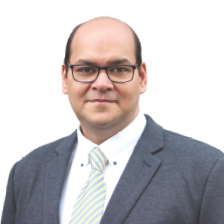
Prof. Dr. Engr. Rizwan Ahmed Khan
Professor & Dean
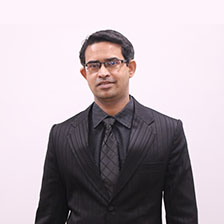
Prof. Dr. Engr. Sheeraz Arif
Professor & Chairperson
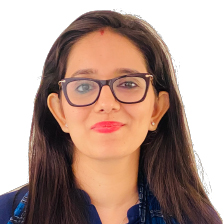
Dr. Samita Bai
Assistant Professor
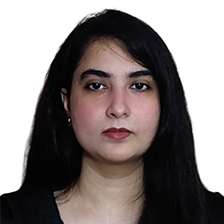
Ms. Sidra Nasir
Lecturer
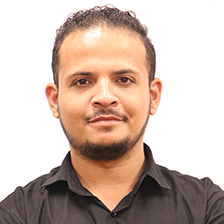
Mr. Umer Mehmood
Lecturer
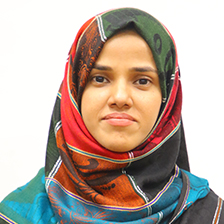
Ms. Sumra Khan
Lecturer
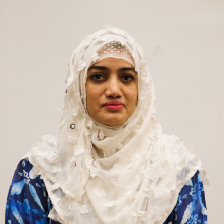
Ms. Saadia Karim
Lecturer
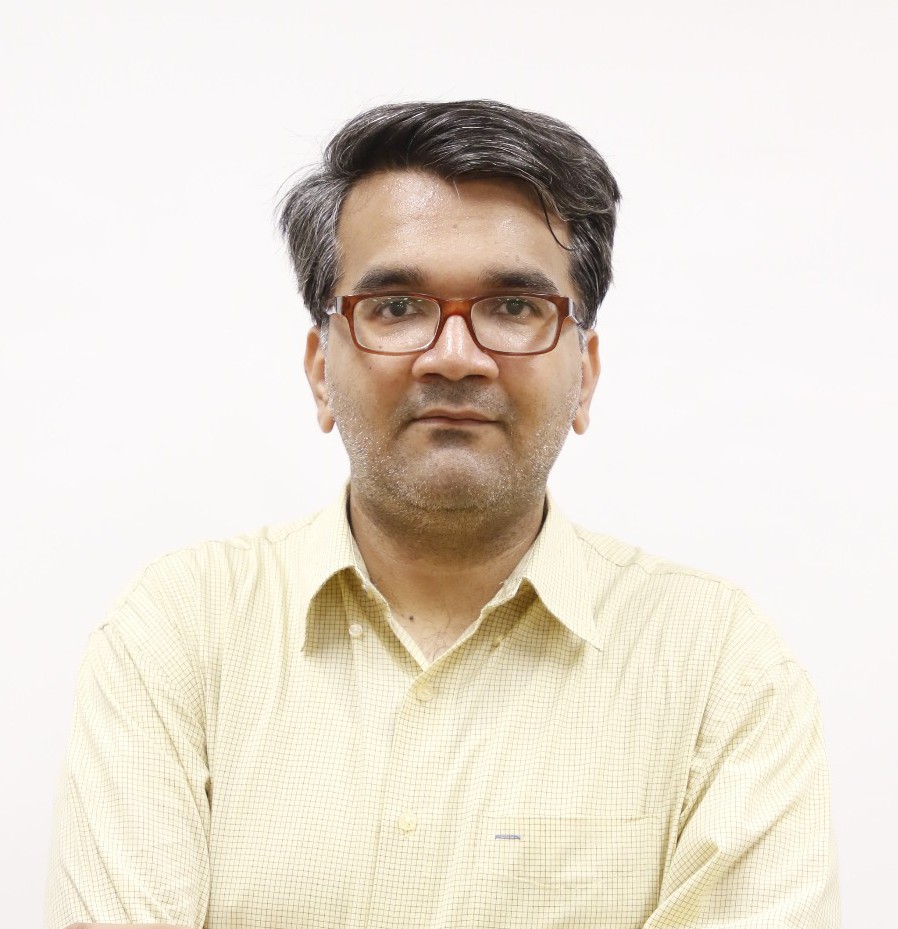
Mr.Bilal Ahmed
Lecturer
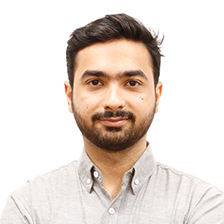
Mr. Ateeque Rahman
Lecturer
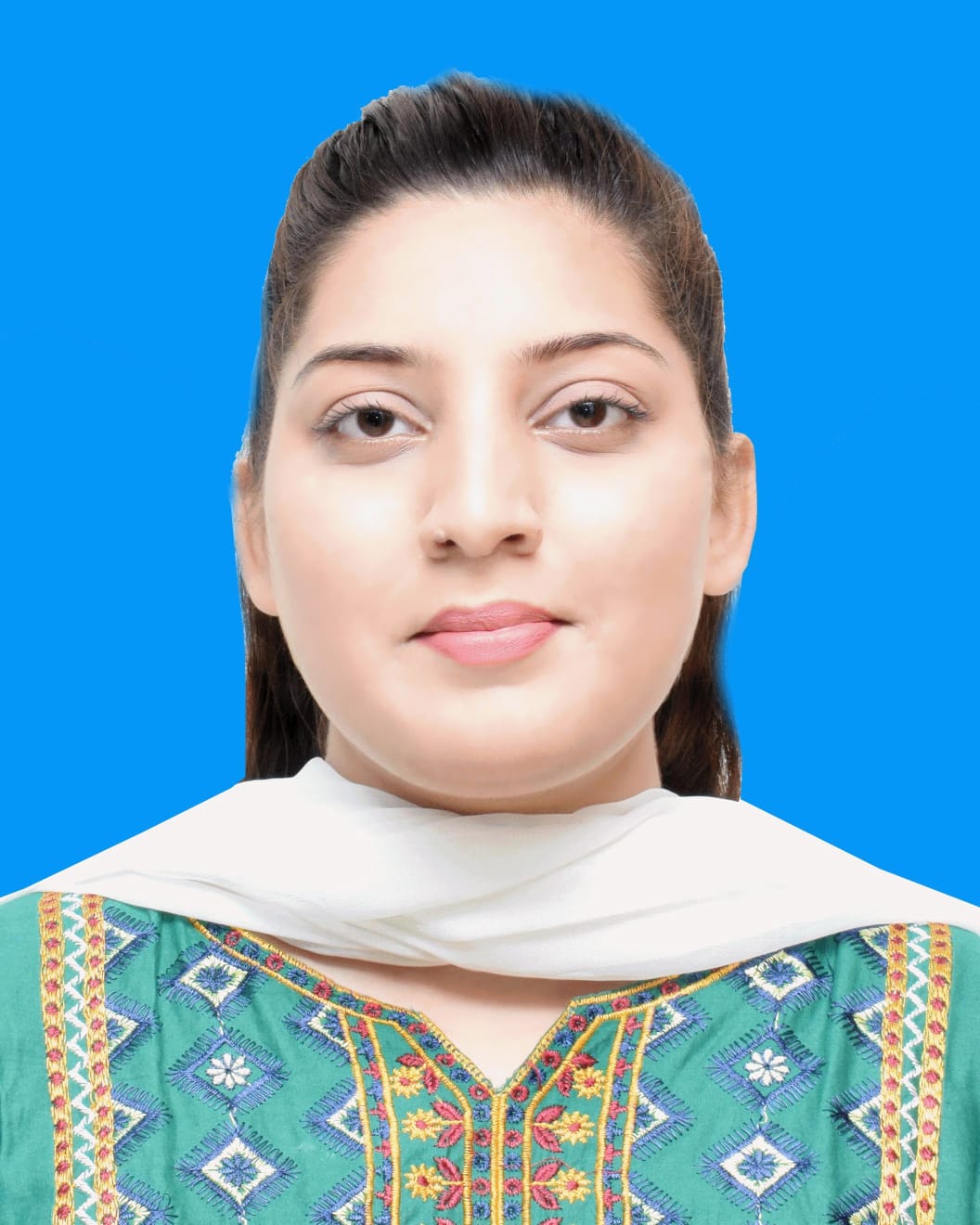
Ms. Meerab Amir
Lecturer
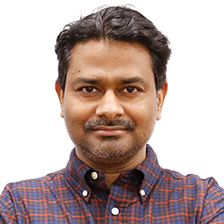
Mr. Muhammad Fahim
Lecturer
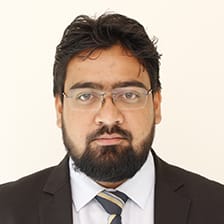
Mr. Muhammad Owais
Lecturer

Mr. Farzeen Ali
Research & Teaching Associate
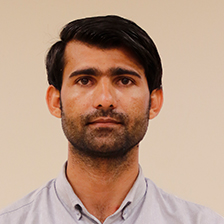
Mr. Mansoor Ahmed
Research & Teaching Associate
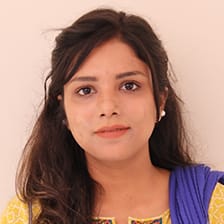
Ms. Sania Mariam
Research & Teaching Associate
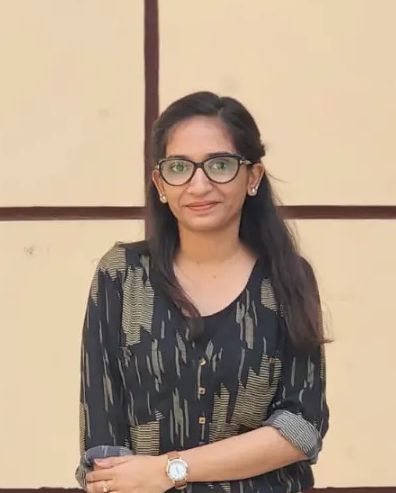
Ms. Seema Hashwani
Research & Teaching Associate
Faculty Spotlight (Invited Speaker / keynote Speaker)
Prof. Dr. Rizwan Ahmed Khan
1. Erasmus Mundus Scholarship - a life changing journey, European Commission Erasmus+, EU Roadshow Event at Balochistan University of Information Technology, Engineering and Management Sciences (BUITEMS), Quetta on June 13, 2024.
Prof. Dr. Rizwan Ahmed Khan
2. Advancing Healthcare: The Confluence of AI, Computer Vision, and Medical Imaging, Mini Symposium on AI in Health Sciences. Center for Artificial Intelligence in Health Sciences (PCMD) and Education Network (SIREN), International Center for Chemical and Biological Sciences (ICCBS), University of Karachi, 24th April 2024. .
Prof. Dr. Rizwan Ahmed Khan
3. AI: A Transformative Agent in Higher Education - 2nd IEMC Symposium (Integrating Effective Methodologies in the Classroom), DHACSS College for Women, DHA Phase VIII, Karachi, Feb 2024.
Prof. Dr. Rizwan Ahmed Khan
4.Elevating Healthcare: The Convergence of AI and Medical Imaging - 3rd Annual Biological Science Conference, Aga Khan University, Karachi, Nov 2023.
Prof. Dr. Rizwan Ahmed Khan
5.The role of Artificial Intelligence in healthcare - International research Symposium 2023. Dow University of Health Sciences (Dow Institute of Health Professionals Education (DIHPE)). Karachi, March 2023.
Prof. Dr. Rizwan Ahmed Khan
6.Life after graduation - Preparing for Erasmus Mundus Scholarship - Represented European Education at Habib University Karachi. Feb 2023.
Dr. Samita Bai
1.1st International Multidisciplinary Conference on Emerging Trends in Engineering Technology-2023 (1st IMCEET-2023), - Represented European Education at Habib University Karachi. Feb 2023.
Dr. Samita Bai
2. IEEE R10 WIE Champions Initiate “Building a Brighter Future”, - Hamdard University & Mehran University of Engineering & Technology, keynote speaker on the topic “Role of Women in AI”. 13th December 23.
Dr. Samita Bai
2. IEEE-SSUET-WIE celebrated International IEEE WIE Day 2024 ‘TechConnect'24’ , Sir Syed UET, invited as guest panel discussion on topic “AI & 4IR Technologies for Women”. 26th June 2024.
Student Achievements
1. Computer Science students presented their projects at the Habib University Research Symposium held on Tuesday, May 16, 2023, which featured projects from students of several leading institutions. Student team from Computer Science department working on Breast Cancer Analysis under the supervision of Prof. Dr. Rizwan Ahmed Khan, Dean, Faculty of Information Technology, Salim Habib University, won Third Prize! The students behind the prize-winning project, titled 'Explainable Artificial Intelligence (XAI) For Breast Cancer Classification' are Maryam Ahmed and Tooba Bibi.
2. Prof. Dr. Rizwan Ahmed Khan, Dean, Faculty of Information Technology, Salim Habib University, was an Invited Speaker at The Aga Khan University's 3rd Annual Biological Sciences Conference: From Basics to Breakthroughs, that took place on Wednesday, November 15, 2023. His presentation, titled 'Elevating Healthcare: The Convergence of AI and Medical Imaging', was an enriching experience for all who attended. Computer Science students Aliza Alwani, Dileep Kumar, and Hasaan Abdullah, were awarded Second Prize for their research poster on 'Machine Learning Approach for Early Parkinson’s Disease Identification through Voice Analysis', among forty incredible presentations.
3. Student team consisting of Aliza Alwani, Dileep Kumar, and Hasaan Abdullah from the department of Computer Science were awarded third Place for their project ‘Predictive Analysis of PCOS on Ultrasound Images Using XAI and MLOps.’ At the Dhanani School of Science and Engineering (DSSE) Undergraduate Research Symposium (DURS 2024) , Habib University, Karachi, on Thursday, May 16, 2024. The prize-winning project was supervised by Prof. Dr. Rizwan Ahmed Khan, Dean, Faculty of Information Technology, Salim Habib University. Undergraduate students from various universities, including Habib University, SZABIST, FAST National University, and NED University, also presented their research at the event.
Shining Stars
Name: Fatima Tuz Zehra
Secured French University Scholarship For MSc (Internet of Things and Cybersecurity)
Organization: Faculte Des Sciences et Technologies. Universite de Lille, France
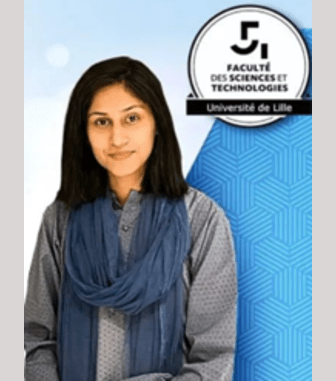

Name: Laviza
Designation: Cybersecurity Analyst
Organization: British Telecom, UK
Name: Tayyab Ahmed
Designation: Senior Flutter Developer
Organization: Sentrax Ltd
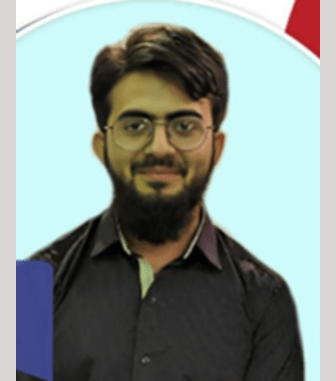

Name: Maryum Ahmed
Designation: Artificial Intelligence Engineer
Organization: Remote
Name: Tooba Bibi
Designation: Artificial Intelligence Engineer
Organization: Taleemabad
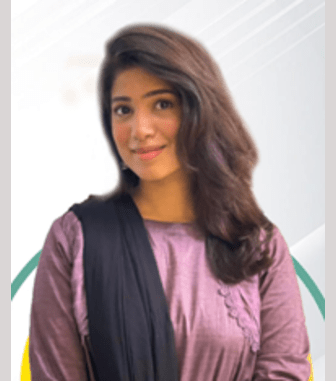
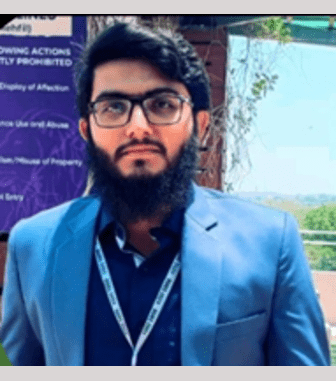
Name: Abdullah Asif
Designation: Flutter Developer
Organization: Atlas Autos (Pvt) Limited
Name: Muhammad Faizan Khalid
Designation: Full Stack Developer
Organization: AsyncTech (Pvt.) Limited
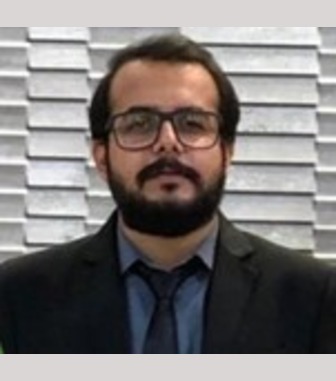
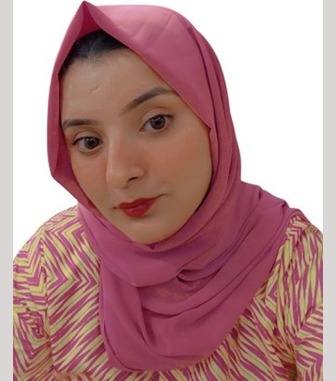
Name: Alisha Fatima
Designation: Business Development Associate
Organization: One world immigration law consultant
Name: Nisha Fatima
Designation: (SAP B1) Management Training Officer (MTO)
Organization: Supernova Solutions Ltd
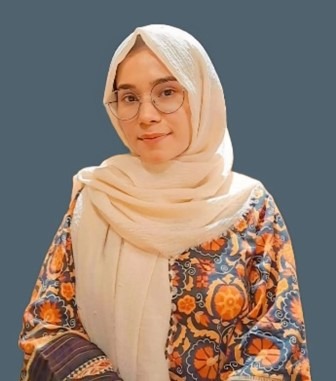
➤ Apply for Admission
















